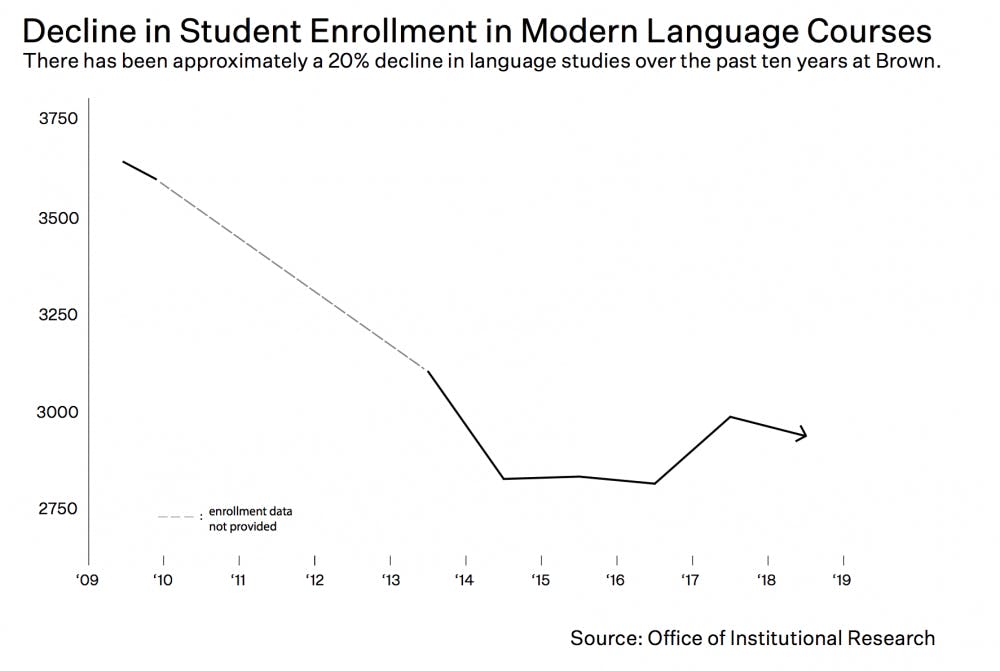Following a finding last year that enrollment in language courses has seen a 20 percent decrease over the last 10 years, the University has made strides toward addressing the decline.
At a February 2019 faculty meeting, Dean of the Faculty Kevin McLaughlin stated that the University planned to create a more robust center for language study, develop Ph.D.-level programs and increase focus on non-European language departments. In response to the issue, the “Center for Language Studies is trying to make languages have bigger footprint on campus,” said Jane Sokolosky, distinguished senior lecturer in German Studies and Language Studies and director of the Center for Language Studies.
The data presented at that meeting originated from a cycle of external evaluations, McLaughlin said. At the time, all six departments of modern languages as well as the Center for Language Studies were under review. Nationally, language departments were seeing a decline: Between 2009 and 2016, enrollment in languages other than English dropped 15.3 percent, according to the Modern Language Association.
Considering these data, the University decided to take “a step back (to) look at our data internally and look at the data the language association provided” to see what steps the University could take, McLaughlin said.
According Sokolosky, the initial data provided at the faculty meeting initiated important conversations about “the role of languages at Brown.” In the 2018-19 academic year, 2,937 students enrolled in language classes. Enrollment has hovered around this number for the last five years, with 3,101 students enrolled in language classes during the 2013-14 academic year. Sokolosky noted that there has only been a five percent decrease overall in undergraduate enrollment in modern languages. While enrollment in some languages has decreased, other languages like Korean and American Sign Language have actually seen increased enrollment in the last few years, Sokolosky said.
“Now we are digging deeper into that data, and seeing that we were at a good position, but we need to be in a better position,” she added.
Investments made into the Center for Language Studies include hiring a new assistant of technology, inviting students to run open hours as language ambassadors and implementing student-run language tables across campus. Sokolosky also stated that the CLS is working on offering new language courses in order to “represent all geographical parts of the world.”
In addition, the Center for Language Studies intends to improve Ph.D.-level language programs. Thus far, it has hired personnel to assist graduate students with professionalization, Sokoloksy said. McLaughlin added that professors on the lecturer track also play a key role in enhancing language instruction in general.
McLaughlin said that the University plans to take a special look at the language departments besides European languages — especially East Asian Studies, as it has seen an increase in student interest. The focus will be on hiring new faculty and lecturers as well as offering other languages, such as Vietnamese.
Looking forward, McLaughlin and Sokolosky both stressed the importance of faculty advising students about the benefits to studying a language. While he knows that students are responsible for the classes that they take, McLaughlin hopes advisors will encourage students to consider taking a language during their time at Brown. “Learning languages is one of the most valuable things that you can (do) as a undergraduate,” he said.
Sokolosky highlighted that language scholarship is not only a part of the University’s intention to create global citizens, but that students gain a lot professionally from studying languages. Studying a language allows students to develop key soft skills, as in class “they learn to excel in difficult situations, ... learn to think on their feet, ... speak deliberately ... (and) to be very humble about making mistakes,” she said.
Sokolosky also stressed that learning a language is key for those who want to enter the global job market: Just as an engineer must learn calculus in order to excel, a student should learn a language if they “want to go in International Business, work in Diplomacy, work in Public Health or Global Health,” Sokolosky said.
Michael Chen ’22, an economics and international relations concentrator, has taken multiple language courses. For him, studying a new language is not just a learning opportunity, “it’s more about opening doors.”





